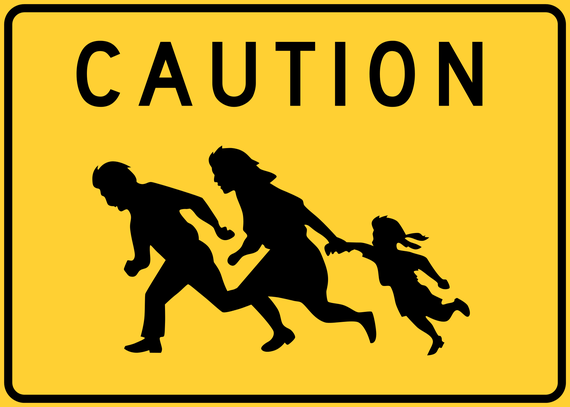Out beyond ideas of wrongdoing and rightdoing there is a field.I'll meet you there.
When the soul lies down in that grassthe world is too full to talk about.- Rumi
A man, a woman, and a little girl in pigtails. Three black silhouettes leaning forward, almost desperately, against a bright yellow background. "Caution: Immigrants Crossing."
John Wood, a staff artist at the California Department of Transportation, was commissioned to design that road sign in the late 1980s, at a time when nearly one hundred undocumented immigrants had been killed while running across San Diego's Interstate 5 to evade the authorities. His "running family" would become the most iconic symbol of immigration in the world.
The characters are deliberately painted black. What they are running from, or toward, is also deliberately unclear. They could be anybody.
Any one of the 500,000 Syrians, Kosovars, Afghanis, Albanians, Iraqis, Pakistanis, Eritreans, Serbs, Ukrainians, and Nigerians who crossed the border into the European Union this year. Who ran across tunnels and camped along borders. Climbed over fences and dug under walls. Drifted in dinghies and crouched in the back of trucks. Negotiated, paid, and begged. For a second chance at an identity only 120,000 of them might get. The rest will be sent home. Whatever that means to someone deliberately out of context, place, and time.
Nationalism is a western concept that originated with the development of European capitalism, industrialization, and colonial expansion. It is based on the premise that an individual's identity is determined first and foremost by his homeland, the nation-state.
The notion was first and most powerfully manifested in the American and French revolutions. Then there were coups in Latin America, colonies and independence movements in Asia and Africa. Between the "deal makers and map drawers," spatial borders were swiftly set. But it was the mental ones they failed to account for.
Industrialization drove the Europeans south in search of resources. War and poverty drove the rest of the world north in search of survival. People were crossing borders in every direction. Defining lines became constraining lines, and the world was soon "deformed by nation states."
Today, 59.5 million people are considered displaced: "forced to leave their home because of war, persecution, or natural disaster." Of those, 10 million are nationless: belonging to no state or nation. Then there are the "international bastards - born in one place and choosing to live elsewhere." The countless for whom home has been displaced, and displacement has become home.
The nationless by choice. I am one of those.
I traded a nation I outgrew for one I hoped would be a better fit. I ran, it now seems in zigzag, from one motherland to another, from a life I had to one I wanted. And I succeeded, to some extent. I picked up a new driver's license and a new last name that I pronounce with the new accent of a new language. I chose a new identity, and dressed for the part. Like the Turkish astronomer in Antoine de Saint Exupéry's "Little Prince," who traded his traditional costume for a European one and presented the same discovery to the same audience, "and this time everybody accepted his report."
"I am a mongrel of place. Of race. Of cultures. Of many genres."-Michael Ondaatje
We cross borders to escape the identities we inherited. But at the end of the day, we can only outrun them so far. Henri Troyat fled the Soviet Union aboard the last émigré boat from the Crimea to Constantinople, and spent the rest of his life writing about a Russia he lost in a France he adopted. Salman Rushdie wrote about India in Britain, and about Britain in the United States. And Michael Ondaatje, the self-proclaimed "mongrel," still writes about a Sri Lanka 4,000 miles and a childhood away.
And I, I still love labne. Fairuz still makes me cry, my father still calls me albe. At the end of the day, I am a Turkish astronomer running around in a European costume, humming Arabic lullabies and making anise tea.
And at the end of the day, one day, I will stop running, and I will die, "containing a richness of lovers and tribes, tastes I have swallowed, bodies I have plunged into and swum up as if rivers of wisdom, characters I have climbed into as if trees, fears I have hidden in as if caves."
For "all I desired was to walk upon such an earth that had no maps."― Michael Ondaatje, The English Patient
This post was originally published here, on the author's blog, Aristotle at Afternoon Tea.

